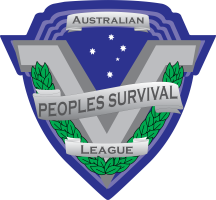Our Structure
The Australian Peoples Survival League has a rank structure for all survivalist members which is replicated and inspired from the military, but methodically adapted to specifically suit the requirements for leadership in a crisis. Members are able to achieve higher ranking depending on their commitment and level of involvement. Some members are recognised for their previous experience. Positions are many and allocated according to our Geographic Area Structure and area of responsibility.
A common question we are asked is why do we have ranks? These are our reasons:
- Leadership in a crisis.Vital for maintaining civility or restoring civility.
- Responsibility to execute the purposes and functions set out, with higher ranking denoting more knowledge and experience in delivering our goals and ensuring the survivability of the Australian people.
- Backbone of hierarchy that defines who reports to whom in delivering outcomes and ensures the orderly flow from higher to lower and that responsibility is delivered and clearly assigned, a clear chain of command to deliver outcomes. Those outcomes are the maintenance or restoration of society (civility).
- It ensures discipline by making authority visible and respected. This obedience and respect maintains cohesion, especially in high stress situations of marauder threats or societal breakdown where disobedience can cost lives (because supply/food or life saving measures were not delivered).
- Prevents disputes over authority, enables large scale organisation.
- Ranks ensure promotions through experience, time, training and leadership ability since advancement is tied to recognition and responsibility.
- Ranks signal to others the level of skill and trustworthiness of an individual. This was identified in an extensive survey of Australian people and how they would react in a time of severe crisis.
- In summary, these ranks exist to provide structure, authority, discipline and efficiency, turning a group of individuals into an effective survivability system in fulfilling our goal(s) and purposes.
Our members wear a uniform, which is part of our leadership training. The uniform helps to develop self-discipline, personal responsibility, and self respect. When the uniform is worn, it not only represents themselves, but the entire organisation in the view of the general public.
Our ranks are divided into two categories:
Main Ranks consist of Associates, members, Cadets, Non-Commissioned Officers (NCO's) and Warrant Officers. Cadets are our youth program. The others involve hands on local and dispersed crisis assistance, planning and practice. Minimal administrative functions are required and forms the bulk of our membership. Main ranks handle frontline tasks, some technical work and execution of survival instructions. Some NCO's participate in special focused technical and administrative activities. NCO's act as the backbone of the training, bridging the gap between lower ranks and officers. It all ensures they know their role within the broader mission of survival of the Australian peoples in the affected area no mater how wide.
Commissioned Officers who form the committee command administration management, and the strategy of the league is in delivering survivability outcomes. This involves administration skills, but also involves different levels and areas of crisis assistance, most with expert skill sets and a high level of leadership training. This training filters down to lower ranks to deliver outcomes.
Promotional Opportunities for all
There are ample opportunities for promotion. How far you go, depends on how committed you are, responsibility you're willing to take on and vacancies. You can simply lead your family or step up further to lead a local group and be in charge by helping new members and draw up plans. If your first in your area to step up, your immediately offered the ability to be recognised with a 'lead in' promotion.
Challenge yourself to become a leader of your family. Or step up further by becoming an Officer in charge of a group, a community, a district, a municipality, or state operations!
To be eligible, you must have demonstrated good conduct, lead by example and be dedicated to learning and applying your training and survival skills whilst building your local family, and mutual assistance friendships. We aim to make it as easy as possible, by providing the tools, knowledge base and mentoring.
Some especially skilled persons are offered the opportunity to be recognised into senior roles. This is based on their qualifications and importance of their skill set. For example, those with certain types of medical experience are offered commissions, since they have skills which are in demand in a crisis.
Stepping up to be an Officer is a privileged position. You'll need to be present in online or 'in person meetings' as well as being present at the Annual General Meeting. There are some great privileges in officer positions, such as being able to sit in on state or national command meetings and contribute to the running and expansion of the league, to ensure more of us survive a crisis!
